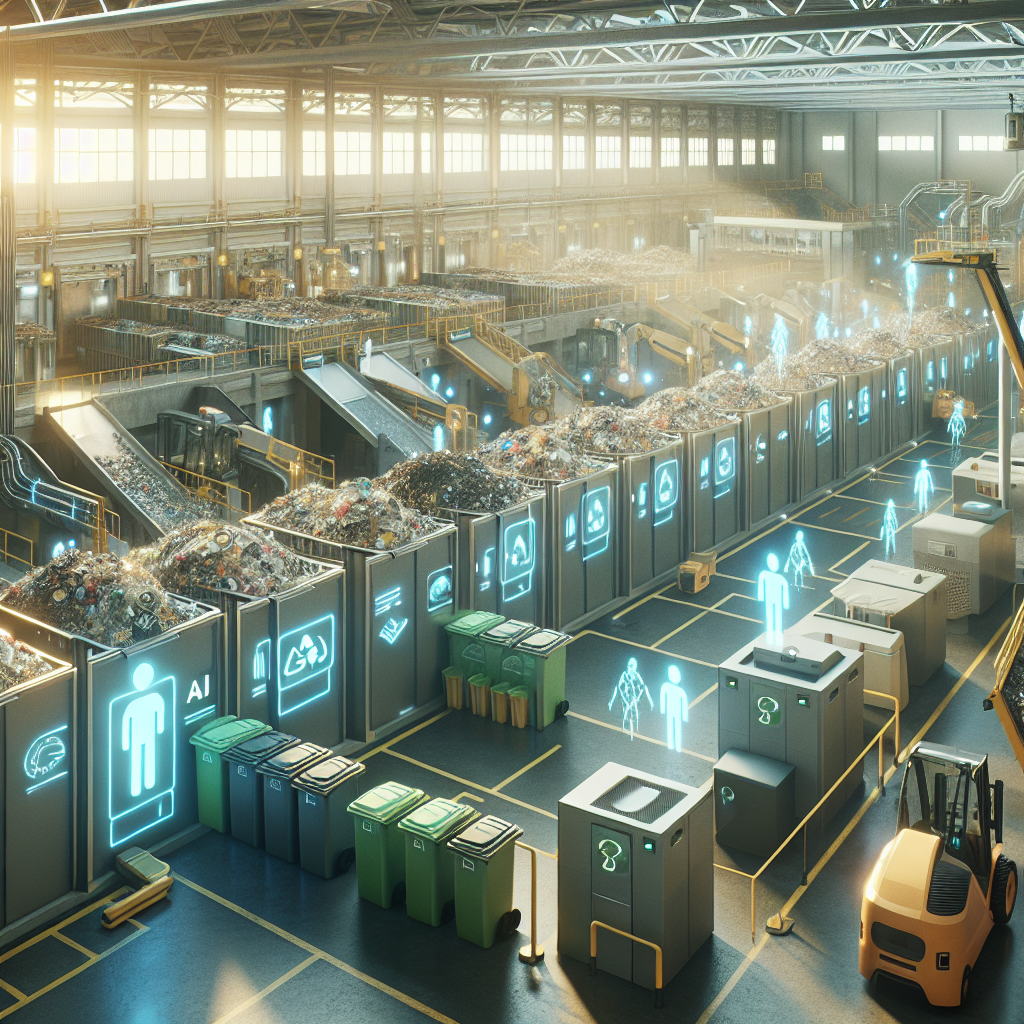Understanding AI and Sustainability
Artificial Intelligence (AI) is increasingly recognized as a powerful tool for enhancing sustainability across various sectors. At its core, AI involves the use of algorithms and data-driven models to perform tasks that typically require human intelligence. By leveraging AI, industries can optimize processes, reduce waste, and make more informed decisions, contributing to a more sustainable future. The synergy between AI and sustainability initiatives is particularly crucial as the world faces pressing environmental challenges.
AI’s impact on sustainability can be categorized into several key areas:
- Energy Management: AI algorithms can predict energy demand and supply, optimize energy use, and integrate renewable energy sources more efficiently. This leads to significant reductions in carbon emissions and operational costs.
- Agriculture: AI technologies enable precision farming, which enhances crop yields and reduces the use of water, fertilizers, and pesticides. This not only increases food production but also minimizes environmental impact.
- Waste Reduction: AI-driven systems can improve waste sorting and recycling processes, leading to more efficient resource recovery and less landfill waste.
While AI holds substantial promise for promoting sustainability, it also presents challenges that need careful consideration:
- Data Privacy: The use of AI requires vast amounts of data, raising concerns about privacy and security. Ensuring that data is collected and used responsibly is paramount.
- Resource Intensity: AI technologies can be resource-intensive, particularly in terms of energy consumption for processing and storage. Balancing AI’s benefits with its environmental footprint is essential.
| AI Application | Potential Benefits | Challenges |
|---|---|---|
| Energy Management | Reduced emissions and costs | Data privacy issues |
| Agriculture | Increased yields, reduced resource use | Resource intensity |
| Waste Reduction | Efficient recycling, less landfill waste | Implementation costs |
AI in Energy Management
Artificial Intelligence (AI) is increasingly becoming a pivotal tool in optimizing energy management systems. Through advanced algorithms and machine learning, AI can analyze vast amounts of data to predict energy consumption patterns, enhance energy storage solutions, and improve the efficiency of energy grids. For instance, AI systems can forecast energy demand with remarkable accuracy, allowing energy providers to adjust supply dynamically, thus reducing waste and lowering costs.
One of the key areas where AI has made significant strides is in the integration of renewable energy sources. By using predictive analytics, AI can manage the variability and intermittency of renewable energy sources such as solar and wind. This capability ensures a more stable and reliable energy supply, integrating these sustainable energy sources into the grid effectively. The result is not only a reduction in reliance on fossil fuels but also a decrease in greenhouse gas emissions.
Moreover, AI-driven energy management systems can facilitate demand response strategies, which are crucial for balancing supply and demand in real-time. These systems can identify peak usage times and automatically adjust energy usage or activate distributed energy resources to alleviate strain on the grid. This flexibility not only enhances grid stability but also empowers consumers to benefit from cost savings by optimizing their energy usage patterns.
In summary, AI’s role in energy management is multifaceted and transformative. It offers solutions that are not only efficient but also sustainable, helping to pave the way for a future where energy systems are cleaner, smarter, and more resilient. The ongoing development and deployment of AI technologies in this sector promise to unlock new potentials for sustainable energy management worldwide.
AI for Sustainable Agriculture
Artificial Intelligence (AI) is revolutionizing agriculture, offering innovative solutions to enhance productivity while promoting environmental sustainability. By leveraging AI technologies, farmers can optimize resource use, reduce waste, and minimize the ecological footprint of farming activities. One of the primary applications of AI in agriculture is precision farming, which involves the use of data analytics and machine learning algorithms to make informed decisions about crop management.
Precision farming enables farmers to monitor soil conditions, crop health, and weather patterns in real time. This data-driven approach allows for the precise application of water, fertilizers, and pesticides, ensuring that crops receive the exact amount of resources they need. As a result, farmers can achieve higher yields while reducing environmental impact. For instance, AI-powered drones and sensors can detect areas of a field that require attention, allowing targeted interventions and preventing overuse of chemicals.
AI also plays a crucial role in enhancing supply chain efficiency. By predicting demand and optimizing logistics, AI helps reduce food waste and ensures that agricultural products reach markets in a timely manner. Furthermore, AI systems can analyze vast amounts of data to forecast crop yields, enabling better planning and decision-making for farmers and distributors alike.
| AI Application | Benefit |
|---|---|
| Precision Farming | Optimizes resource use, increases crop yield |
| Supply Chain Management | Reduces food waste, improves logistics |
Despite the numerous benefits, the implementation of AI in agriculture also presents challenges. Issues such as data privacy, high costs, and the need for technological infrastructure can impede widespread adoption. However, with continued innovation and investment, AI has the potential to drive significant advancements in sustainable agriculture, ultimately contributing to a more resilient and efficient food system.
AI-Driven Waste Reduction
Artificial Intelligence (AI) is revolutionizing waste management systems around the globe, offering innovative solutions to minimize waste production and enhance recycling processes. By leveraging AI technologies, cities and companies can optimize waste collection routes, accurately sort recyclables, and reduce human error in waste processing. These advancements not only lead to more efficient operations but also contribute significantly to environmental sustainability.
One of the critical applications of AI in waste reduction is the optimization of collection routes. Cities can utilize AI algorithms to analyze data from various sources such as GPS and traffic systems to determine the most efficient routes for waste collection trucks. This optimization not only reduces fuel consumption and emissions but also cuts down on operational costs. Furthermore, AI can predict the volume of waste in different areas, allowing for dynamic scheduling and resource allocation.
AI technology also plays a crucial role in improving sorting processes at recycling facilities. Automated sorting systems equipped with AI and machine learning capabilities can identify and separate different types of materials with high precision. This reduces contamination levels and increases the quality of recycled materials. The following table illustrates the improvements in sorting accuracy through AI integration:
| Material Type | Traditional Sorting Accuracy (%) | AI-Enhanced Sorting Accuracy (%) |
|---|---|---|
| Plastics | 85 | 95 |
| Metals | 88 | 98 |
| Paper | 80 | 92 |
Moreover, AI-driven analytics can help identify patterns and trends in waste generation, allowing stakeholders to implement targeted reduction strategies. By analyzing data from smart bins and sensors, AI systems can provide insights into consumer behavior and waste patterns. This information is invaluable for creating educational campaigns and incentives that encourage waste reduction at the source.
Smart Cities and AI
Artificial Intelligence (AI) is a cornerstone in the development of smart cities, facilitating sustainable urban environments through intelligent resource management and enhanced quality of life. By integrating AI technologies, cities can optimize energy consumption, reduce waste, and improve urban mobility. These advancements are crucial in addressing the growing challenges of urbanization and environmental sustainability.
One of the key areas where AI contributes to smart cities is energy management. AI systems can predict energy demand and supply accurately, allowing for more efficient distribution and reduced energy waste. Through the use of smart grids, AI enables real-time data analysis and decision-making, which leads to optimized energy consumption patterns and integration of renewable energy sources.
- Energy Management: AI-driven smart grids optimize energy use.
- Transportation: AI enhances traffic flow and reduces emissions.
- Waste Management: AI systems improve waste sorting and recycling processes.
In addition to energy, AI plays a significant role in transforming urban mobility. AI-powered traffic management systems can analyze traffic patterns and adjust signals to reduce congestion and emissions. This real-time optimization enhances public transportation efficiency and encourages the use of eco-friendly transport options. Moreover, AI facilitates the implementation of autonomous vehicles, which promise to further reduce the carbon footprint of urban transportation.
AI also revolutionizes waste management in smart cities. By employing AI algorithms, cities can enhance waste sorting processes, leading to increased recycling rates and reduced landfill usage. AI systems can analyze waste collection data to optimize routes and schedules for waste collection vehicles, minimizing fuel consumption and associated emissions.
| AI Application | Impact on Sustainability |
|---|---|
| Smart Grids | Optimizes energy consumption, integrates renewables |
| Traffic Management | Reduces congestion and emissions |
| Waste Management | Increases recycling, reduces landfill use |
AI in Water Resource Management
Artificial Intelligence (AI) stands at the forefront of revolutionizing water resource management, offering innovative solutions to one of the most pressing sustainability challenges. With increasing water scarcity affecting millions globally, AI technologies are being leveraged to optimize the usage and distribution of water resources efficiently. AI systems are facilitating smart water management through predictive analytics, which can foresee demand and supply patterns, thus allowing for better planning and conservation strategies.
One of the key areas where AI is making a significant impact is in leak detection and repair. Traditional methods of identifying leaks in vast water distribution networks can be labor-intensive and inefficient. AI algorithms, however, can analyze data from sensors in real-time to detect anomalies that may indicate leaks, enabling quick and precise responses to fix them. This not only conserves water but also reduces the energy consumed in water treatment and distribution processes.
Furthermore, AI-driven platforms are enabling more sophisticated irrigation practices in agriculture, which is one of the largest consumers of water resources. By utilizing AI, farmers can access detailed insights into soil moisture levels, weather forecasts, and crop water requirements, leading to more efficient water use. This not only aids in water conservation but also enhances crop yields, contributing to food security.
Table 1: Impact of AI on Water Management
| AI Application | Impact on Water Management | Benefits |
|---|---|---|
| Predictive Analytics | Forecasts water demand and supply | Optimizes resource allocation |
| Leak Detection | Identifies leaks quickly | Reduces water loss and energy consumption |
| Smart Irrigation | Improves irrigation efficiency | Conserves water and increases yields |
In conclusion, while AI offers promising advancements in water resource management, challenges such as data privacy, high costs, and the need for technical expertise persist. Nonetheless, the integration of AI into water management systems represents a pivotal stride towards achieving sustainable water resource utilization for future generations.
AI Innovations in Transportation
Artificial intelligence is reshaping the transportation sector, offering innovative solutions to enhance sustainability and efficiency. With the integration of AI technologies, transportation systems are witnessing a transformation that promises reduced emissions, optimized routes, and improved fuel economy. These advancements not only support environmental goals but also introduce economic benefits by lowering operational costs.
One of the primary applications of AI in transportation is in the development of autonomous vehicles. These self-driving cars utilize sophisticated algorithms to navigate roads, reducing the likelihood of human error and improving traffic flow. By optimizing driving patterns, autonomous vehicles can contribute to significant fuel savings and lower greenhouse gas emissions. Additionally, AI-driven traffic management systems are being employed to analyze real-time data, enabling dynamic adjustments to traffic signals and reducing congestion in urban areas.
Moreover, AI is instrumental in the optimization of public transportation systems. Machine learning models are being used to predict passenger demand, allowing for more efficient scheduling and route planning. This ensures that buses and trains operate at optimal capacity, minimizing energy consumption. Furthermore, AI-powered predictive maintenance helps in prolonging the lifespan of transportation infrastructure and vehicles, thus reducing waste and resource consumption.
| AI Application | Impact on Sustainability |
|---|---|
| Autonomous Vehicles | Reduces emissions, improves fuel efficiency |
| Traffic Management Systems | Minimizes congestion, lowers pollution |
| Public Transport Optimization | Enhances efficiency, decreases energy use |
Despite these promising developments, challenges remain in the widespread adoption of AI in transportation. Concerns regarding data privacy, the need for robust cybersecurity measures, and the ethical implications of autonomous decision-making must be addressed. Nonetheless, the potential for AI to drive significant advancements in sustainable transportation is undeniable, providing a pathway to greener urban environments and more efficient global logistics.
AI for Biodiversity Conservation
Biodiversity conservation is a critical area where AI has shown great promise. By leveraging advanced algorithms, AI can help identify and track endangered species, monitor ecosystems, and predict changes in biodiversity. For instance, AI-powered cameras and drones are being utilized to capture images and videos in remote areas, which are then analyzed using machine learning models to identify various species. This not only helps in cataloging species but also in understanding their behaviors and habitats.
The role of AI in biodiversity extends to predictive analytics, where AI models can forecast the impact of environmental changes on different species. These predictions can be pivotal in formulating conservation strategies. For example, AI systems can analyze climate data to predict habitat shifts due to global warming, enabling proactive measures to protect at-risk species. Furthermore, AI can assist in identifying illegal poaching activities by analyzing patterns from surveillance data, thus playing a significant role in wildlife protection.
In addition to these applications, AI can facilitate citizen science projects by enabling non-experts to contribute to biodiversity data collection. Through intuitive apps, people can capture and upload images of local wildlife, which AI systems then classify and analyze to provide insights into regional biodiversity health. Below is a simple representation of AI applications in biodiversity conservation:
| AI Application | Description |
|---|---|
| Species Identification | Utilizing image recognition to catalog and monitor species. |
| Predictive Analytics | Forecasting environmental impacts on habitats and species. |
| Anti-Poaching Surveillance | Analyzing data to detect and prevent illegal hunting activities. |
Ethical Considerations of AI in Sustainability
The integration of Artificial Intelligence into sustainability efforts is not without its ethical challenges. As AI systems become more prevalent in managing resources and optimizing processes, questions arise about data privacy and security. Data collection is a foundational element of AI, and in the context of sustainability, this often involves gathering sensitive information from individuals and communities. Ensuring that this data is used ethically and stored securely is paramount to maintain public trust and prevent misuse.
Moreover, the deployment of AI technologies can exacerbate existing inequalities if not carefully managed. The digital divide means that some communities may not have access to the latest AI tools, potentially widening the gap between those who can benefit from AI-driven sustainability solutions and those who cannot. To address these disparities, it is crucial to develop inclusive policies that promote equitable access to AI technologies for all communities, particularly marginalized groups.
There is also the matter of accountability in AI-driven sustainability initiatives. When AI systems make decisions that impact the environment or communities, it is essential to have clear guidelines on who is responsible for these decisions. This calls for a robust framework that defines the roles and responsibilities of AI developers, users, and policymakers. Such a framework can help ensure that AI applications are aligned with ethical standards and contribute positively to sustainability goals.
Finally, the environmental impact of AI itself must be considered. While AI can drive sustainability, the energy consumption required for training and operating AI models can be significant. A balanced approach is necessary to maximize AI’s benefits while minimizing its carbon footprint. Policymakers and developers should work together to innovate energy-efficient AI solutions and promote sustainable practices within the tech industry.
AI’s Impact on Supply Chain Efficiency
Artificial Intelligence (AI) is revolutionizing supply chain efficiency by providing advanced tools for forecasting, inventory management, and logistics optimization. With AI-driven analytics, companies can predict demand patterns more accurately, reducing the risk of overproduction or stockouts. This not only saves costs but also minimizes waste, contributing to sustainability goals. For instance, AI can analyze historical data and market trends to optimize inventory levels, ensuring that resources are used efficiently.
One of the key areas where AI excels is in the optimization of logistics and transportation. AI algorithms can determine the most efficient routes for delivery trucks, taking into account variables such as traffic, weather conditions, and fuel consumption. This leads to a significant reduction in carbon emissions, as vehicles spend less time on the road. Moreover, AI can facilitate real-time tracking of goods, allowing companies to respond swiftly to any disruptions, thereby maintaining a smooth supply chain flow.
| AI Application | Benefit |
|---|---|
| Demand Forecasting | Reduces waste and improves resource allocation |
| Route Optimization | Decreases carbon emissions and fuel costs |
| Real-time Tracking | Enhances responsiveness to disruptions |
Furthermore, AI’s role in enhancing supply chain visibility cannot be understated. By deploying machine learning algorithms and IoT devices, companies can gain comprehensive insights into every stage of the supply chain. This transparency helps in identifying bottlenecks and inefficiencies, enabling proactive measures to address them. In addition, AI-powered systems can facilitate better supplier collaboration, ensuring that sustainability practices are upheld throughout the supply chain.
- Improved demand forecasting leads to better inventory management.
- Enhanced routing efficiency reduces environmental impact.
- Greater supply chain transparency fosters sustainable practices.
AI and Climate Change Mitigation
Artificial Intelligence (AI) has emerged as a powerful tool in the fight against climate change, offering innovative solutions to mitigate its effects. One of the primary ways AI contributes to climate change mitigation is through enhanced energy efficiency and management. By leveraging AI algorithms, energy consumption patterns can be analyzed and optimized to reduce waste and improve the efficiency of energy systems. For instance, AI can predict energy demand more accurately, allowing for better integration of renewable energy sources such as solar and wind into the power grid.
Furthermore, AI plays a crucial role in monitoring and reducing greenhouse gas emissions across various industries. Advanced machine learning models can analyze vast amounts of data to identify emission sources and suggest actionable strategies for reduction. AI-powered systems can continuously monitor industrial processes to ensure they operate within environmental compliance, thus minimizing their carbon footprint. Additionally, AI can aid in the development of carbon capture and storage technologies, which are essential in reducing the amount of CO2 released into the atmosphere.
Another significant application of AI in climate change mitigation is in the transportation sector. AI-driven systems can optimize traffic flow and reduce congestion, leading to lower emissions from vehicles. Electric vehicles (EVs) also benefit from AI through improved battery management systems that extend battery life and efficiency. Moreover, AI can facilitate the development of innovative transportation models such as autonomous vehicles, which can further decrease carbon emissions by optimizing routes and reducing idle times.
Finally, AI contributes to climate change mitigation through its application in climate modeling and prediction. By processing complex climate data, AI can enhance the accuracy of climate models, making it easier for policymakers to make informed decisions. AI’s ability to simulate potential climate scenarios also aids in developing effective climate policies and adaptation strategies. The integration of AI in climate science not only helps in understanding the current impacts of climate change but also in predicting future trends, enabling proactive measures to safeguard the environment.
Challenges and Opportunities in AI for Sustainability
As artificial intelligence continues to evolve, its potential to enhance sustainability efforts becomes increasingly evident. However, along with the opportunities come significant challenges. One of the primary challenges is the high energy consumption associated with AI technologies. Training complex AI models often requires substantial computational power, which can lead to increased carbon emissions if not managed properly. Conversely, AI offers the opportunity to optimize energy usage in various sectors, potentially offsetting its own carbon footprint. For example, AI can enhance the efficiency of renewable energy sources by improving grid management and predicting energy demand more accurately.
Another challenge is the ethical considerations surrounding data usage in AI systems. Sustainability initiatives often require large datasets to train AI models. The collection and use of this data raise concerns about privacy and data security. Nevertheless, there are significant opportunities to leverage AI in improving data-driven decision-making processes. In agriculture, AI can analyze data from satellite images and sensors to optimize water usage, predict crop yields, and minimize the use of fertilizers and pesticides, leading to more sustainable farming practices.
The deployment of AI in waste management also presents both challenges and opportunities. On one hand, the integration of AI in sorting and recycling processes can significantly reduce waste by improving the accuracy and efficiency of these systems. AI can identify recyclable materials with greater precision, thereby reducing the burden on landfills. On the other hand, the complexity and cost of implementing such advanced technologies can be a barrier for some regions, particularly in developing countries. It is crucial to address these disparities to ensure equitable access to AI’s benefits in sustainability.
Finally, collaboration between stakeholders is essential to maximize the potential of AI for sustainability. Governments, private sectors, and research institutions must work together to develop frameworks that promote the ethical and efficient use of AI technologies. By addressing these challenges and leveraging the opportunities, AI can play a pivotal role in driving sustainable futures.
Future Trends in AI and Sustainability
As we look to the future, the integration of Artificial Intelligence (AI) in sustainability efforts is expected to accelerate, driven by technological advancements and the pressing need to address environmental challenges. One significant trend is the development of AI-driven smart grids, which optimize energy distribution and consumption. These grids utilize predictive analytics to balance supply and demand efficiently, reducing energy waste and lowering carbon emissions. Additionally, AI algorithms can process vast amounts of data from renewable energy sources, enhancing their integration into the power grid and promoting a more sustainable energy landscape.
In the realm of agriculture, AI is poised to revolutionize practices through precision farming techniques. By employing data from satellite imagery and IoT devices, AI can provide real-time insights into soil health, crop growth, and weather patterns. This enables farmers to make informed decisions, optimize resource usage, and increase yields while minimizing environmental impact. As a result, AI not only contributes to food security but also supports sustainable land management by reducing the need for chemical inputs and water usage.
The future also holds promise for AI’s role in waste management and reduction. AI-powered robotics and sorting systems are being developed to improve recycling processes, ensuring that more materials are recovered and reused. These systems can accurately identify and separate different types of waste, significantly enhancing the efficiency of recycling facilities. Moreover, AI-driven platforms are emerging to manage supply chains, helping companies track and minimize waste from production to distribution. This trend is crucial for achieving a circular economy, where resources are continuously reused, reducing the strain on natural resources.
However, the path forward is not without challenges. As AI technologies become more prevalent, concerns about data privacy, security, and ethical considerations must be addressed. Ensuring that AI systems are transparent and accountable will be vital in gaining public trust and maximizing their potential for sustainability. Collaboration between governments, industries, and academia will be essential to create frameworks that guide the responsible development and deployment of AI in sustainability initiatives.



